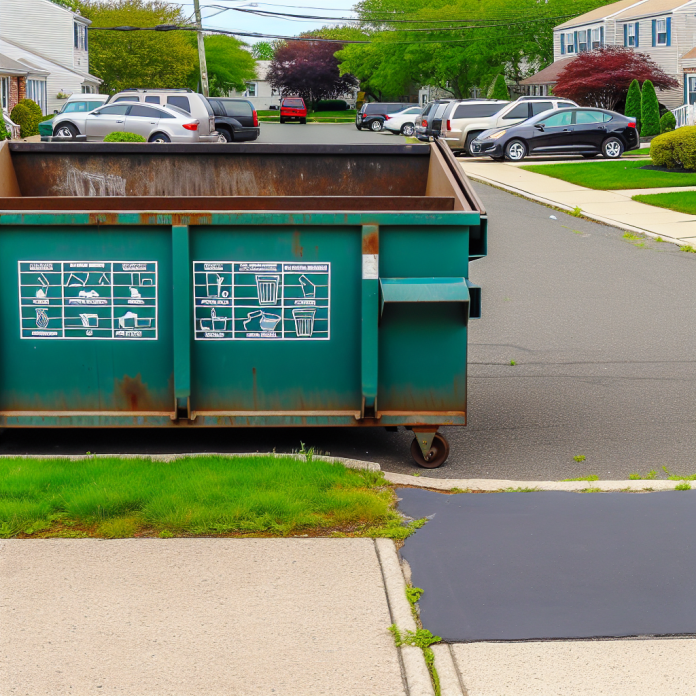When it comes to dumpster rental tips in NJ, understanding the local landscape is essential for homeowners in New Jersey. Renting a dumpster not only simplifies waste management during home projects but also mandates awareness of permit requirements and placement guidelines unique to each municipality. To ensure a smooth rental process, familiarity with specific rules concerning dumpster permits in NJ and HOA dumpster guidelines is crucial. Additionally, homeowners must navigate the nuances of choosing dumpster size NJ to suit their project needs effectively. By following these tips, residents can avoid common pitfalls and streamline their cleanup efforts.
Navigating the process of renting a waste container can be a daunting task, especially when considering essential aspects such as local regulations and property guidelines. Whether you’re undertaking a home renovation, a cleanout, or a landscaping project, it’s crucial to understand how dumpster rentals function in your area, particularly in New Jersey. Ensure you familiarize yourself with the necessary dumpster permits and placement requirements to avoid unexpected fees or delays. Choosing the right size of rental is also vital – a too-small dumpster can lead to overages, while one that’s too large may incur unnecessary costs. By keeping these factors in mind, residents will find that their project runs smoother and stays within budget.
Essential Tips for Renting a Dumpster in New Jersey
When renting a dumpster in New Jersey, it’s essential to keep a few key tips in mind. First, understand the various sizes available. The volume of waste generated from your project will dictate the size of the dumpster needed. For instance, a small home project may only require a 10 cubic yard container, while larger renovations or cleanouts could necessitate a 20, 30, or even 40 cubic yard dumpster. By selecting the right size, homeowners can avoid overages and save money on rental costs.
In addition to size, it’s beneficial to do some research on local dumpster rental companies. Look for providers that have a strong reputation in the community, offering clear rental terms and reliable service. Companies that understand New Jersey’s local regulations, such as permit requirements and dumpster placement guidelines, can greatly simplify the rental process. Moreover, timely delivery and pickup from a reputable company can ensure that a project stays on schedule without unnecessary delays.
Understanding Dumpster Permits in NJ
Navigating the permit requirements for dumpster rental in New Jersey can be tricky, but it’s crucial for homeowners to understand where and how their dumpster can be placed. If you’re planning to have the dumpster on your private property, such as a driveway or yard, you’re likely in the clear without needing a permit. However, placing a dumpster on public streets or sidewalks will almost always necessitate obtaining a permit from the local government. This is to ensure that safety and accessibility for pedestrians and vehicles are maintained.
The specifics can vary significantly between municipalities, so homeowners should check with their local city or town office to confirm requirements. There are also instances where homeowners’ associations (HOAs) may impose added regulations concerning dumpster permits and placement, so it’s vital to be informed about those stipulations as well. By being proactive about understanding permit requirements, homeowners can avoid potentially costly fines or project interruptions.
Choosing the Right Dumpster Size for Your Project
Selecting the appropriate dumpster size is a critical step in the rental process. Homeowners must evaluate the nature of their project to determine the volume of debris they will generate. A 10 cubic yard dumpster is usually sufficient for smaller tasks like garage cleanouts, whereas larger home renovations such as kitchen remodels typically require anywhere from 20 to 40 cubic yards. This careful consideration of size helps minimize both rental costs and hassles during the project.
It’s also wise to consult with your dumpster rental provider, who can offer insights into optimal sizes based on their experience. Accurate sizing can prevent the hassle of oversizing, which incurs higher costs, or the inconvenience of running out of space, which can lead to delays. Remember that renting the right size dumpster not only aids in efficient waste management but makes the cleanup process smoother overall.
Meeting Dumpster Placement Requirements in New Jersey
Proper dumpster placement is vital to facilitate seamless delivery and removal. Homeowners should ensure the area is free of any obstructions that might hinder access for the delivery truck. This includes not only physical objects but also considering overhead issues like low branches or wires that can interfere with the truck’s operation. A level, paved surface is ideal as it prevents the dumpster from sinking or shifting during the rental period.
Moreover, it’s essential to review local placement regulations, as some municipalities in New Jersey have specific guidelines about where dumpsters can be located. Ensuring compliance with these requirements not only avoids potential fines but also promotes a safer environment for neighbors and passersby. By taking the time to ensure proper placement, homeowners can contribute to a smooth rental experience.
Navigating HOA Guidelines for Dumpster Rentals
For those living in HOA-controlled communities, checking the specific guidelines related to dumpster rental is crucial. Many HOAs have strict rules regarding the placement, size, and duration for which dumpsters may be allowed on your property. Violating these guidelines can lead to penalties, fines, or even disputes with your neighbors, so it’s best to be thoroughly informed before making arrangements.
Homeowners should start by reviewing their HOA’s covenants or reaching out directly to board members for clarifications. Some associations may require prior approval for renting a dumpster or specify whether it should be hidden from view. Understanding these requirements can help homeowners navigate potential obstacles while planning their project, allowing for a smoother rental process and overall experience.
Planning your Dumpster Rental Duration Effectively
When choosing how long to rent a dumpster, an honest evaluation of your project’s timeline is essential. Many homeowners think they can complete projects quickly, but unexpected delays often occur. Therefore, planning a rental period of one to two weeks is generally advisable for most home improvement tasks, striking a balance between efficiency and flexibility.
Additionally, discussing your project’s scope with the dumpster rental provider is crucial. They can assist in assessing how long you’ll realistically need the dumpster based on past experiences and similar projects. By being transparent and planning accordingly, you can avoid extra fees associated with extended rentals, ensuring that your cleanup or renovation stays within budget and progresses smoothly.
Maximizing Efficiency During Your Dumpster Rental
To maximize the efficiency of your dumpster rental, proper organization is key. As homeowners sort through their project debris, having a designated area for items to be thrown away helps streamline the loading process. A well-planned approach not only saves time but also minimizes the chance of running out of space in the dumpster.
In addition, consider combining different types of waste within the dumpster to avoid multiple pickups. For instance, if you’re remodeling a kitchen, you can include old cabinetry, countertops, and other waste in one load. Understanding how to sort and utilize your dumpster effectively can lead to a more organized cleanup, thereby enhancing productivity in your project.
Understanding Dumpsters and Recycling in New Jersey
Many homeowners are now looking for eco-friendly options when it comes to waste management. This includes knowing what can and cannot be recycled when renting a dumpster. In New Jersey, many dumpster rental companies have recycling programs to promote sustainability. Familiarizing yourself with these options can help ensure that recyclable materials are processed appropriately instead of ending up in landfills.
Additionally, recycling can sometimes impact the size of the dumpster needed for your project. If a significant portion of your waste is recyclable, opting for a smaller dumpster can be a feasible choice. Providers often offer separate containers for different types of waste. Homeowners should inquire about these options and consider scheduling separate pickups for recyclables to enhance their waste management strategy.
Cost Considerations for Renting a Dumpster in NJ
Understanding the cost associated with dumpster rentals is vital for any homeowner in New Jersey. Rental prices can vary widely based on factors such as dumpster size, rental duration, and disposal fees. It’s important to request a detailed quote from your provider, which should outline all anticipated costs to avoid unexpected charges.
Moreover, determining whether the quoted price includes fees for permits, transportation, or disposal can provide greater clarity. Some areas may charge individuals for permits, while others might have additional disposal fees for specific materials. By thoroughly understanding the potential costs and any associated fees, homeowners can make more informed decisions and better manage their project budgets.
The Role of Local Regulations in Dumpster Rentals
Local regulations play an important part in the dumpster rental process, particularly in New Jersey where municipalities have specific guidelines. Familiarity with these regulations can help homeowners avoid costly fines and nuisances associated with improper usage. Each community may have its regulations about placement, size, and duration, making research a crucial first step before renting.
Homeowners should proactively engage with local authorities to clarify any ambiguities regarding dumpster rentals. This can be accomplished through browsing municipal websites or calling local offices. By being well-versed in the rules and regulations, homeowners can not only streamline their rental experiences but also contribute to maintaining safety and order in their communities.
Frequently Asked Questions
What are the basic dumpster rental tips for residents in New Jersey?
Before renting a dumpster in New Jersey, homeowners should understand local regulations, especially concerning dumpster permits in NJ. No permit is needed for placement on private property like driveways, but a permit will be necessary if placed on public streets or sidewalks. It’s also important to verify HOA dumpster guidelines, choose the right dumpster size based on the project needs, and ensure proper placement for easy access.
Are dumpster permits required when renting a dumpster in NJ?
Yes, dumpster permits in NJ are required when placing a dumpster on public property, such as sidewalks or streets. However, no permit is needed if the dumpster is placed on private property, like a driveway or yard. Always check with your local municipality for specific rules to avoid fines.
How do I choose the right dumpster size for my project in NJ?
Choosing the right dumpster size in NJ depends on the project’s scope. Common sizes include 10, 20, 30, and 40 cubic yards. For small cleanouts, a 10 cubic yard dumpster might suffice, while larger renovations may require a 30 or 40 cubic yard container. Consult with your local dumpster rental provider for tailored advice based on your specific needs.
What are the dumpster placement requirements in NJ?
In NJ, proper dumpster placement requirements include selecting a flat, accessible area for delivery and pickup. The dumpster should not obstruct sidewalks or public spaces. Check for low-hanging branches or other obstructions that could hinder access. Avoid placing dumpsters on soft ground to prevent sinking.
How can HOA guidelines impact my dumpster rental in NJ?
HOA dumpster guidelines in NJ may restrict where you can place the dumpster, its size, and how long it can remain. It’s essential to understand these rules to avoid fines or violations. Many HOAs will require prior approval before placing a dumpster, so always review your HOA’s regulations before proceeding.
What is the typical rental duration for dumpsters in New Jersey?
The typical rental duration for dumpsters in New Jersey ranges from one to two weeks, depending on your project size. Smaller tasks usually require less time, while larger renovations may take longer. Communicate clearly with your dumpster rental provider about your project’s duration to avoid unexpected charges or issues.
What should I do to prepare for dumpster delivery in NJ?
To prepare for dumpster delivery in NJ, ensure that the designated placement area is flat, accessible, and free from obstructions like low branches or parked vehicles. It’s also helpful to check HOA guidelines regarding dumpster placement and size before the delivery date to avoid potential issues.
Can I rent a dumpster for a home renovation project in NJ?
Absolutely! Renting a dumpster for a home renovation project in NJ is a great way to manage waste efficiently. Be sure to choose the right dumpster size for your specific project and check local regulations or permit requirements related to dumpster rental.
| Key Points | Details |
|---|---|
| Permit Requirements | Permits are not needed for dumpsters on private property, but are required for those on public streets or sidewalks. |
| Choose the Right Size | Common sizes include 10, 20, 30, and 40 cubic yards. Selecting the right size based on project needs is crucial. |
| Proper Placement | Ensure the area is flat and accessible for delivery and pickup. Avoid soft ground or overhead obstacles. |
| Check HOA Guidelines | Review your HOA rules about dumpster use to avoid fines or violations before renting. |
| Plan Rental Duration | Realistically plan rentals for 1-2 weeks based on project size to avoid extra charges. |
Summary
When considering dumpster rental tips in NJ, homeowners should be aware of local laws and permit requirements to streamline their projects. This includes understanding where dumpsters can be placed, ensuring the appropriate size is chosen for the workload, and checking homeowner association guidelines to prevent unexpected fines. Effective communication with rental companies can significantly enhance the rental experience, allowing for smoother waste management and keeping projects on track. By following these essential tips, homeowners can achieve a hassle-free cleanup or renovation process.
Source: https://homelysolve.com/what-do-homeowners-need-to-know-before-booking-a-dumpster-in-nj/
### Transforming Your Home: Top Remodeling Trends in Orange County
As homeowners in Orange County look to elevate their living spaces, understanding the latest remodeling trends is essential. With the median home value soaring to $1.18 million, it’s no surprise that affluent demographics in cities like Laguna Beach and Newport Beach are planning high-value renovations ranging from $50K to $500K+. Whether it’s modernizing a kitchen or adding an outdoor living space, OC residents are seeking contractors who can deliver quality work aligned with California building codes and local aesthetic preferences.
### Embrace Sustainable Solutions for Remodeling in OC
In a climate-conscious market like Orange County, incorporating eco-friendly materials and sustainable practices into remodeling projects has never been more important. Contractors in Costa Mesa and Irvine can leverage opportunities by suggesting energy-efficient windows, solar installations, and sustainable landscaping that comply with California regulations. Building a portfolio around these services not only meets the demand for greener homes but also solidifies a contractor’s reputation as a forward-thinking professional in the OC region.
### Navigating Building Codes and Permits for OC Renovations
Understanding the intricacies of California building codes is crucial for successful home transformations in Orange County. Contractors should be well-versed in local regulations to streamline project timelines for homeowners in cities like Huntington Beach. Offering expertise in the permit application process can set a contractor apart as a trusted advisor. This not only mitigates potential delays but also enhances client satisfaction—leading to referrals and repeat business.
### Local Supplier Insights: Choosing Quality Materials in Orange County
For OC contractors, collaborating with local suppliers can significantly impact the quality and cost of remodeling projects. By sourcing materials within cities like Newport Beach, professionals can reduce lead times and support local businesses, which resonates well with the affluent homeowners in the area. Highlighting local suppliers not only strengthens contractor-client relationships but also enriches the overall remodeling experience, ensuring projects remain within budget while maintaining high standards.
### Opportunity Knocks: Expanding Your Contractor Business in the OC
With the booming home remodeling market in Orange County, contractors have unprecedented opportunities to grow their businesses. Targeting affluent communities through tailored marketing strategies—such as showcasing past projects on social media or participating in local home shows—can draw attention to services such as kitchen remodels, bathroom renovations, and custom outdoor installations. Engaging with the OC community by offering workshops or consultations can also position contractors as the go-to experts, driving both visibility and clientele.
### Your Perfect OC Transformation Awaits
Whether you’re a homeowner in Laguna Beach dreaming of a luxurious kitchen remodel or a contractor looking to tap into the lucrative OC market, understanding what sets Orange County apart is crucial. With the right strategies, resources, and local insights, transforming homes in this vibrant region can lead to stunning results and successful business growth. Embrace the opportunities in Orange County—your ideal renovation or successful project is just around the corner.


